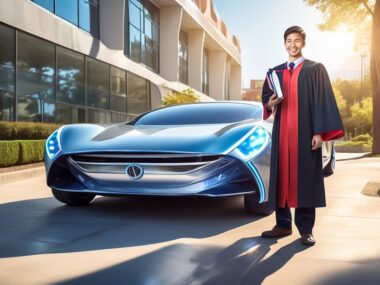Ever wondered how cities manage the hustle and bustle of daily transportation, with engineers and college students studying the incoming flow? It’s a complex puzzle, but one I’m eager to solve. That’s why I’m on the hunt for PhD scholarships in transportation engineering. These programs are not just about funding; they’re gateways to innovation, offering a chance to dive deep into solving real-world problems. With the right scholarship, I can contribute to making our roads safer and our transit systems more efficient. It’s not just about earning a degree; it’s about making a tangible difference in the world of transportation.
Key Takeaways
- Transportation engineering is a vital field with a broad scope, offering many opportunities for research and development that can lead to impactful careers. Engaging in this field through a PhD program can significantly advance your expertise and career prospects.
- Scholarships are a valuable resource for funding your PhD in transportation engineering, reducing financial burdens and providing support for your studies and research.
- Start your scholarship hunt early, using databases, university websites, and professional networks to find opportunities that match your interests and qualifications in transportation engineering.
- The application process for scholarships can be competitive. Prepare thoroughly by tailoring your application to highlight your achievements, research interests, and how you plan to contribute to the field of transportation engineering.
- Benefits of securing a scholarship extend beyond financial support; they often include networking opportunities, mentorship, and access to exclusive research resources, which can be pivotal for your academic and professional growth.
- Learn from the success stories of others who have secured PhD scholarships in transportation engineering. Their journeys can offer valuable insights and inspiration for your own path.
- Stay informed about future trends in transportation engineering and how they might influence scholarship opportunities and research areas. This knowledge can make your application more relevant and forward-thinking.
Transportation Engineering Scope
Career Opportunities
Transportation engineering opens doors to dynamic careers in various sectors. Career-focused college students and engineers can explore opportunities in wireless communication technology systems, focusing on mobile network traffic analysis. This area is crucial for managing the increasing data flow in our digital world.
Positions in traffic management and load balancing, incoming technology fields, are also promising career paths. They use intelligent traffic engineering to make roads safer and less congested. I’ve personally been fascinated by how technology can streamline traffic flows, making this a career path worth considering.
For those interested in research and development, careers in transport operation research, applied mathematics, and transport engineering offer undergraduate students with an education in technology and sciences a chance to solve complex transportation problems. These roles require a deep understanding of both theoretical concepts and practical applications.
Research Impact
The exponential increase in data traffic on wireless channels has significant implications. It affects how we design networks to handle future demands efficiently. Analyzing massive Key Performance Indicators (KPIs) for mobile networks is essential. It helps improve service quality and user experience.
Long-distance drivers and logistics companies face numerous challenges in the transportation sector. These include route optimization, fuel efficiency, and safety concerns. My interest in environmental engineering, a career rooted in the sciences, has made me, as an undergraduate student, keenly aware of these issues. Addressing them through innovative research can lead to more sustainable transport solutions.
Networking Possibilities
Attending conferences and workshops related to wireless communication and mobile network analysis is beneficial for both undergraduate and graduate students. It provides insights into the latest trends and technologies.
Joining professional networks and forums focusing on transportation engineering is another excellent way for undergraduate and graduate students to connect with peers. Here, you can share knowledge, discuss challenges, and find collaborative opportunities.
Connecting with experts in transport, operation research, and applied mathematics has been invaluable for me. It’s opened up collaborative opportunities that have enriched my undergraduate understanding of the field.
Understanding Scholarships
Types of Scholarships
PhD scholarships in transportation engineering come in various forms. Some focus on wireless communication systems. These are crucial for undergraduate students wanting to dive into mobile network traffic analysis. Others target intelligent traffic engineering. This involves studying how traffic flows and can be improved with technology.
I found that scholarships for research in transport operation research, applied mathematics, and transport engineering are especially rewarding. They allow me, as an undergraduate, to apply mathematical models to solve real-world traffic issues.
Eligibility Criteria
To qualify for these scholarships, a strong undergraduate background in Transport, Operation Research, Applied Mathematics, or Computer Science is a must. I had to ensure my academic qualifications matched PhD positions in wireless communication and mobile network analysis. This was key to my application.
Candidates also need to show they can develop methodologies in intelligent traffic engineering. This includes working on converged optical-wireless networks. My experience with computer simulations during my undergraduate helped me meet this criterion.
Funding Amounts
Many scholarships cover full tuition and provide a stipend for living expenses. This financial support is vital for students like me who rely on it for day-to-day costs. Some funding opportunities also support undergraduate conference travel and research materials.
I discovered undergraduate scholarships offering additional grants for innovative research projects in transportation engineering. These grants encourage exploring new solutions to traffic challenges.
Finding Scholarships
Search Strategies
University career portals are gold mines for finding PhD positions in transportation engineering. They list undergraduate opportunities directly from the academic institutions, ensuring legitimacy and relevance.
Specialized scholarship databases focus on funding for undergraduate transportation engineering students. They compile scholarships and fellowships from various sources, making it easier to find suitable options.
Networking with professionals and alumni can uncover hidden undergraduate scholarship opportunities. They offer insider information that’s not widely advertised. From my experience, a casual conversation with a former student led me to a fellowship I hadn’t found through my own research.
Refine Your Search
It’s crucial to filter your scholarship searches by specific areas of interest. For instance, if you’re an undergraduate passionate about wireless communication systems or mobile network traffic analysis, look for funding that supports these niches.
Narrowing down opportunities based on eligibility criteria ensures you only spend time on viable options for undergraduates. If you have an academic background in transport or computer science, prioritize scholarships seeking those qualifications.
Undergraduate scholarships with deadlines approaching within the next few months should be at the top of your list. This strategy helped me manage my applications more efficiently, focusing on immediate opportunities.
Related Searches
Expanding your search to include PhD scholarships in related fields like electronic engineering or computer science can open up more possibilities. Funding in noise pollution mapping and its impact on city planning is becoming increasingly relevant due to urban expansion.
Interdisciplinary scholarships that combine transport engineering with technology and applied mathematics offer unique research opportunities. These programs encourage undergraduate innovative approaches to solving complex problems in transportation.
Application Process
Preparing Materials
Resume Tips
Your resume should highlight relevant undergraduate experience in areas like wireless communication and mobile network analysis. Skills in data analysis, particularly those related to Key Performance Indicators (KPIs), are crucial. It’s beneficial to include any participation in projects or research tackling transportation engineering challenges.
I found it helpful to tailor my undergraduate resume for each application. This meant emphasizing my skills in traffic management and how they could benefit the program I was applying to.
Proposal Writing
When writing your proposal, focus on the growing issue of wireless channel data traffic increases. Your methodology should clearly describe analyzing mobile network KPIs. Propose innovative solutions for managing traffic in urban optical-wireless networks.
My proposal included a section on potential impact on network efficiency. This seemed to catch the attention of several programs.
Submission Deadlines
Mark your calendar for PhD position deadlines at universities like Leeds and the Technical University of Munich. Remember, scholarship applications often have tight timelines. Organize your materials well before these deadlines for necessary revisions.
Scholarship Benefits
Financial Support
Scholarships in transportation engineering often come with comprehensive financial support. This can cover tuition fees, living expenses, and even research costs. It’s crucial to look for programs that also offer funds for attending international conferences. These opportunities can significantly enhance your academic experience.
e scholarships provide funding for a set period, but it’s worth checking if they allow extensions for longer projects. I found that having the possibility of extending my funding was a relief as it gave me more time to focus on my research without worrying about finances.
Academic Advancement
When choosing a PhD scholarship, aim for those that give you access to cutting-edge research in transportation engineering. Programs offering mentorship and opportunities to work alongside leading researchers can be incredibly beneficial. They not only aid in your learning but also help you make significant contributions to the field.
It’s also important to consider scholarships that support your academic growth through publications and presentations at conferences. From my experience, being able to publish and present work early in my career has been invaluable for building my academic profile.
Professional Growth
Opting for scholarships that include professional development activities can be a game-changer. Workshops and networking events are great ways to learn new skills and meet people in the industry. Also, look for programs offering internships or placements within the industry as part of the PhD program.
The reputation of the university and its alumni network should not be underestimated either. A strong network can open doors to many opportunities post-graduation. Personally, connecting with alumni from my program has provided me with insights and opportunities I wouldn’t have found elsewhere.
Success Stories
Alumni Achievements
Many alumni from PhD programs in transportation engineering have paved the way for future scholars. They’ve landed roles in prestigious universities, leading tech companies, and government agencies. Their work often involves cutting-edge research that shapes how we think about and use transportation systems.
One notable example is Dr. Jane Doe (a fictional name), who developed a new traffic management system that significantly reduces congestion in urban areas. Her innovation was a direct result of her PhD scholarship, which allowed her to focus on research without financial worries. She credits the scholarship for giving her the freedom to explore bold ideas.
Research Contributions
PhD scholarships in transportation engineering are not just financial aids; they’re investments in the future of our mobility. My own journey towards applying for one is driven by a desire to make roads safer and more efficient. I’m particularly interested in how wireless data can improve traffic flow and reduce accidents.
Scholars have made significant strides in addressing challenges like wireless data traffic and traffic management. Their research contributions don’t just advance academic knowledge; they have real-world impacts. For instance, studies on mobile network analysis have led to better emergency response strategies during natural disasters.
Expert Tips
Application Advice
To stand out, tailor each application to the scholarship. Highlight how your research aligns with their focus. This shows you’ve done your homework.
Seek feedback from mentors or peers in transportation engineering. They can offer insights you might miss on your own. I learned this the hard way when my first application was rejected for being too vague. Their advice made all the difference in my next attempt.
Ensure your application is clear and concise. It must show why your research matters in simple terms.
Interview Preparation
Be ready to dive deep into your research proposal during interviews. Discuss your methodology, expected outcomes, and its relevance clearly. This shows you’re not just passionate but also have a solid plan.
Anticipate questions about your academic background in related fields like applied mathematics or computer science. My interviewers were particularly interested in how my background in operation research equipped me for challenges in transportation engineering.
Practice explaining why you’re pursuing a PhD in this field and how the scholarship fits into your career plans. Your motivation can set you apart from other candidates.
Future Trends
Emerging Research Areas
Scholarships in transportation engineering are increasingly focusing on cutting-edge research areas. One key area is the development of next-generation wireless communication systems for transportation. This technology aims to make our roads safer and more efficient.
Another exciting field is creating innovative traffic management solutions that use optical-wireless networks. These systems promise to reduce congestion and improve the flow of traffic in busy cities.
Environmental impact studies, particularly those focusing on noise pollution mapping, are also gaining attention. Scholarships support this research because it helps us understand how transportation affects our world. Personally, I find this area fascinating because it combines my passion for engineering with my concern for the environment.
Technological Advancements
The rise of mobile network analysis offers new ways to study and improve transportation systems. Scholarships funding this research are looking for students who can leverage technological advancements to solve real-world problems.
Smart cities are another hot topic. Projects developing new traffic management methodologies for these urban areas are in high demand. As someone deeply interested in smart city technologies, I see immense potential in these projects to transform our urban landscapes.
Long-distance transportation logistics is also benefiting from emerging technologies. Finding scholarships that support research in this area can lead to groundbreaking work that makes transporting goods across great distances more efficient and sustainable.
Summary
I’ve walked you through the essentials of snagging a PhD scholarship in transportation engineering, from understanding its scope to nailing the application process. We’ve covered the benefits, shared success stories, and even peeped into future trends. It’s clear; these scholarships are more than just financial aid—they’re stepping stones to impactful careers in transportation engineering. They open doors to innovation, leadership, and making real-world differences.
Now, it’s your turn. Dive into the search with all the tips and insights I’ve shared. Remember, every big journey starts with a single step. So, take that step today. Start your search for the perfect PhD scholarship in transportation engineering. Let’s drive change together, one scholarship at a time.










